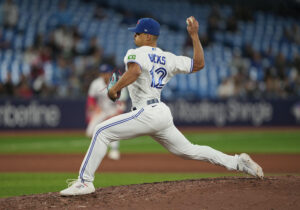Angels right-hander Robert Stephenson is still dealing with some shoulder discomfort and may not be in game shape by the time the season starts, per Jeff Fletcher of the Orange County Register. Manager Ron Washington tells Fletcher that José Soriano may move back to the bullpen to take Stephenson’s spot.
Stephenson, 31, came into camp with some shoulder soreness and he hasn’t yet appeared in an official Spring Training game. As relayed by Fletcher, Stephenson has resumed throwing full bullpens and still plans on being ready for Opening Day, but he has to get over the discomfort and advance to live batting practice before getting some game work in.
Barring a late March signing of Blake Snell or Jordan Montgomery, the Angels’ most significant move of the offseason will be their three-year, $33MM deal for Stephenson. He got that nice deal for himself based on his stint with the Rays in the second half of 2023, when he was one of the most dominant pitchers in the league.
He made 42 appearances for Tampa last year with a 2.35 earned run average, thanks to a new breaking ball. Statcast classified it as a cutter but Fletcher describes it as a tweak to his slider. Regardless of the terminology, it helped him strike out 42.9% of batters faced while walking just 5.7%. His 28.9% swinging strike percentage was more than double last year’s 11.6% league average for relievers.
The Angels were primarily focused on bullpen upgrades this winter with Stephenson the highlight. The only free agent they signed to a major league deal that wasn’t a pitcher was Aaron Hicks, who only requires the Halos to pay the prorated league minimum since the Yankees are still on the hook for the majority of his contract. Pitchers Matt Moore, Luis García, Adam Cimber, José Cisnero, Adam Kolarek and Zach Plesac got one-year deals with Moore’s $9MM the largest of them.
Stephenson’s deal was larger than all of those, in length and in average annual value. It’s unclear if he will miss much time, or even any at all, but it’s not the ideal start to his tenure with the Angels.
In response to his status, the club may be pivoting with Soriano, as mentioned up top. It was reported a couple of weeks ago that the Angels were planning to stretch him out as a starter, though Washington admitted earlier this week that he wouldn’t be able to secure a rotation spot unless there was an injury to one of Reid Detmers, Patrick Sandoval, Tyler Anderson, Griffin Canning or Chase Silseth. Now with Stephenson behind schedule, Soriano might return to the bullpen.
“First, you take care of need, and then you can start thinking long term,” Washington said. “We decided we wanted to try to see if Soriano can start, and so far he has proven to us that he possibly can. Now, Stephenson down that means we’ve got a void in the bullpen. Now we’re going to make a decision on our need right there. Long term would be Soriano being a starter. But if we can’t fill that void in the bullpen, Soriano has done it before. We’ve got an option.”
Soriano came up as a starter in the minors but was significantly delayed as he required two Tommy John surgeries in fairly quick succession, one in February of 2020 and the other in June of 2021, which naturally led to him hardly pitching at all in that 2020-2022 period. He was finally healthy last year and tossed 42 innings for the Angels with a 3.64 ERA. His 12.4% walk rate was on the high side, but that’s hardly surprising given the time he missed. He also punched out 30.3% of batters faced and got grounders on 51% of balls in play.
Based on Washington’s comments, it seems the club still thinks Soriano is a viable starter down the road but he may be used in the bullpen for now. In addition to his 42 innings of major league work last year, Soriano also tossed 23 1/3 innings in Double-A, bringing his tally for the year to 65 1/3. After missing most of the previous three seasons, he would probably run into an innings cap at some point this year if he were acting as a starter the whole time, speculatively in the range of 100 to 120 or so.
He does have a couple of options, so the Halos could perhaps use him as a reliever in the big leagues for now but send him down and stretch him back out later in the year if they want to have him log some innings and perhaps get towards a full starter’s workload in 2025.

